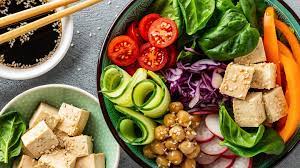The Rise of Veganism: A Plant-Powered Revolution
As the world becomes increasingly conscious of health, environmental sustainability, and animal welfare, the vegan movement has surged into the spotlight. Embracing a lifestyle free from animal products, vegans are not only reshaping their diets but also making a profound impact on global food systems and societal norms.
At its core, veganism is a philosophy that seeks to exclude all forms of exploitation and cruelty to animals. This ethos extends beyond dietary choices to encompass clothing, cosmetics, and other aspects of daily living. By opting for plant-based alternatives, vegans strive to minimize harm to animals while promoting a more compassionate way of life.
One of the key drivers behind the rise of veganism is its undeniable health benefits. Research indicates that plant-based diets can lower the risk of chronic diseases such as heart disease, diabetes, and certain types of cancer. By focusing on whole grains, fruits, vegetables, legumes, nuts, and seeds, vegans are nourishing their bodies with nutrient-dense foods that support overall well-being.
Moreover, the environmental impact of animal agriculture has prompted many individuals to adopt a vegan lifestyle. Livestock farming is a significant contributor to greenhouse gas emissions, deforestation, water pollution, and biodiversity loss. By choosing plant-based foods over animal products, vegans are reducing their carbon footprint and advocating for sustainable practices that benefit the planet.
From innovative plant-based meat substitutes to dairy-free cheeses and egg alternatives, the market for vegan products continues to expand rapidly. Restaurants, food manufacturers, and retailers are catering to the growing demand for cruelty-free options that appeal to vegans and non-vegans alike. This culinary diversity showcases the versatility and creativity inherent in plant-based cooking.
As veganism gains momentum worldwide, it serves as a catalyst for social change and ethical reflection. By challenging conventional norms surrounding food production and consumption, vegans are sparking conversations about ethics, sustainability, and our interconnectedness with all living beings.
Whether motivated by health concerns, environmental considerations or ethical convictions, individuals who embrace veganism are part of a transformative movement that is reshaping our relationship with food and fostering a more compassionate society.
5 Essential Tips for Embracing a Healthy Vegan Lifestyle
- Incorporate a variety of fruits and vegetables in your diet to ensure you’re getting a wide range of nutrients.
- Explore plant-based protein sources such as beans, lentils, tofu, and quinoa to meet your protein needs.
- Read food labels carefully to avoid hidden animal-derived ingredients like gelatin, honey, and certain E-numbers.
- Consider taking supplements for nutrients that are commonly lacking in a vegan diet, such as B12, iron, and omega-3 fatty acids.
- Plan ahead when dining out or traveling by researching vegan-friendly restaurants or packing snacks to ensure you have options available.
Incorporate a variety of fruits and vegetables in your diet to ensure you’re getting a wide range of nutrients.
To optimize your vegan diet, it is essential to incorporate a diverse array of fruits and vegetables into your meals. By embracing a colorful assortment of produce, you can enrich your nutrient intake and ensure that you are receiving a wide spectrum of vitamins, minerals, and antioxidants essential for overall health and well-being. From leafy greens packed with iron and calcium to vibrant berries brimming with antioxidants, each fruit and vegetable brings its unique nutritional benefits to the table, helping you thrive on a plant-powered diet.
Explore plant-based protein sources such as beans, lentils, tofu, and quinoa to meet your protein needs.
To meet your protein needs on a vegan diet, consider exploring a variety of plant-based sources such as beans, lentils, tofu, and quinoa. These nutrient-rich foods not only provide essential amino acids but also offer a range of vitamins, minerals, and dietary fiber to support overall health. Incorporating these plant-based protein sources into your meals can help you maintain a balanced and nourishing diet while enjoying the diverse flavors and textures they bring to your culinary creations.
Read food labels carefully to avoid hidden animal-derived ingredients like gelatin, honey, and certain E-numbers.
When adhering to a vegan diet, it is essential to scrutinize food labels meticulously to steer clear of hidden animal-derived components such as gelatin, honey, and specific E-numbers. These ingredients, though not always obvious at first glance, can be present in a variety of packaged foods and beverages. By being vigilant and thorough in reading labels, vegans can ensure that their dietary choices align with their values and principles, promoting a lifestyle free from animal exploitation.
Consider taking supplements for nutrients that are commonly lacking in a vegan diet, such as B12, iron, and omega-3 fatty acids.
For individuals following a vegan diet, it is advisable to consider incorporating supplements to ensure adequate intake of essential nutrients that are often deficient in plant-based eating patterns. Key nutrients like B12, iron, and omega-3 fatty acids are commonly found in animal products, making supplementation crucial for maintaining optimal health and well-being. By being mindful of potential deficiencies and addressing them through targeted supplements, vegans can support their nutritional needs and thrive on a balanced plant-powered diet.
Plan ahead when dining out or traveling by researching vegan-friendly restaurants or packing snacks to ensure you have options available.
When following a vegan lifestyle, it’s essential to plan ahead, especially when dining out or traveling. By taking the time to research vegan-friendly restaurants or packing your own plant-based snacks, you can ensure that you have satisfying and nutritious options available wherever you go. Planning ahead not only eliminates the stress of finding suitable food choices on the spot but also allows you to fully enjoy your dining experience or travel adventures without compromising your dietary preferences.




